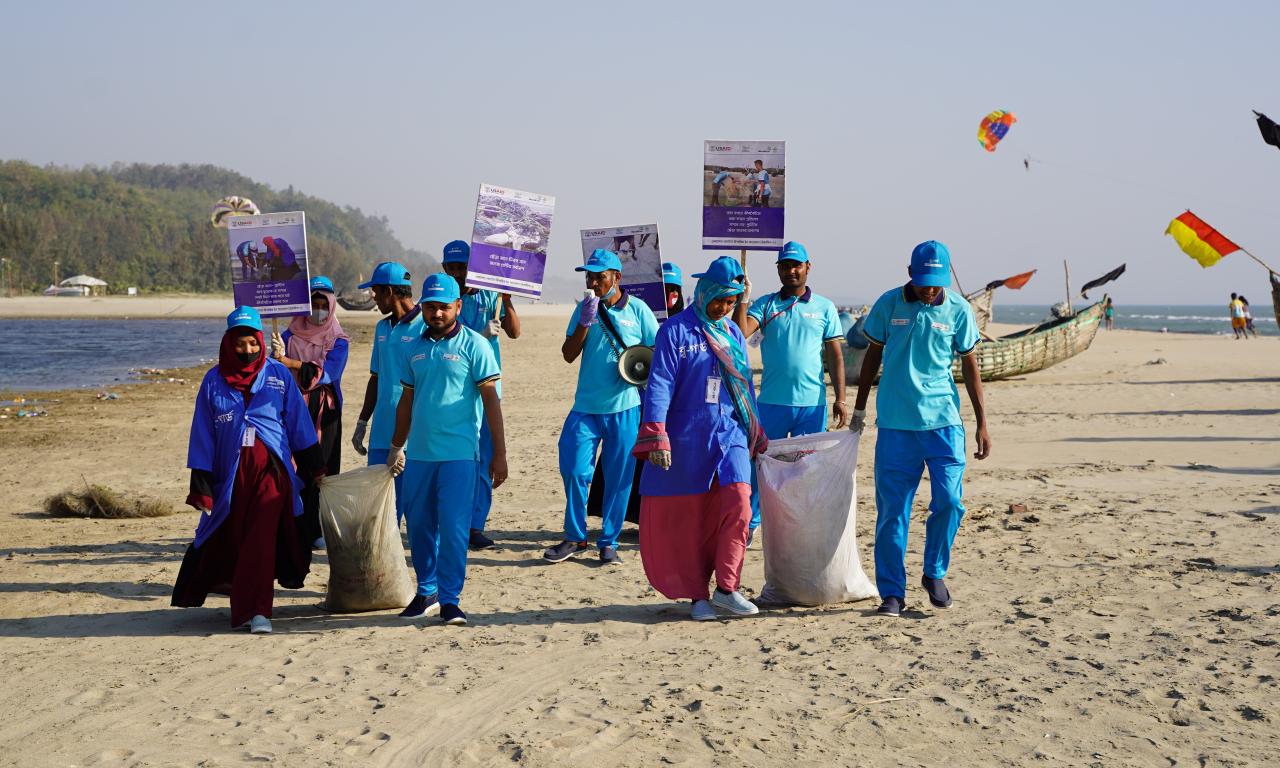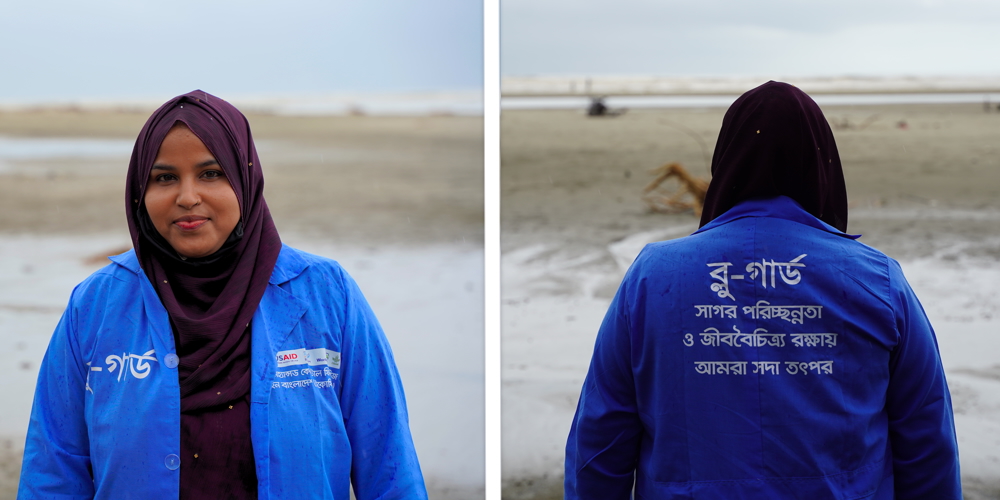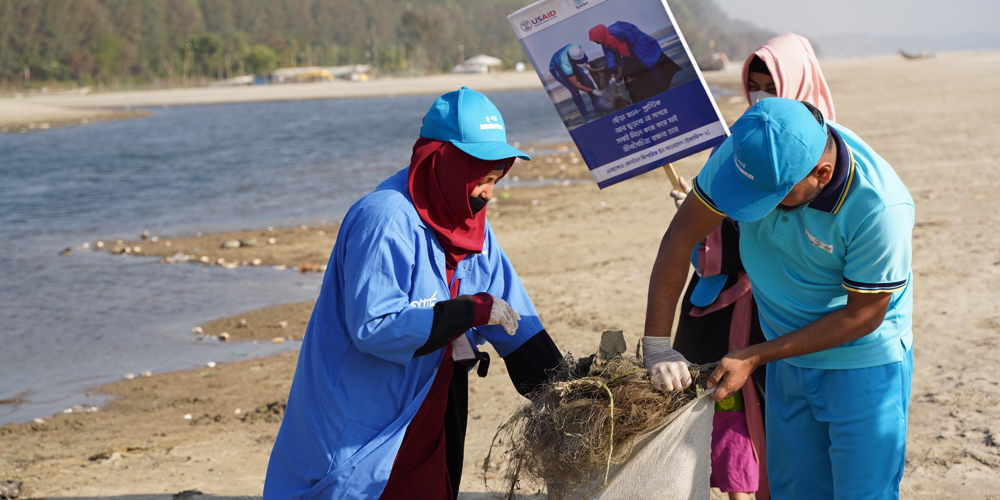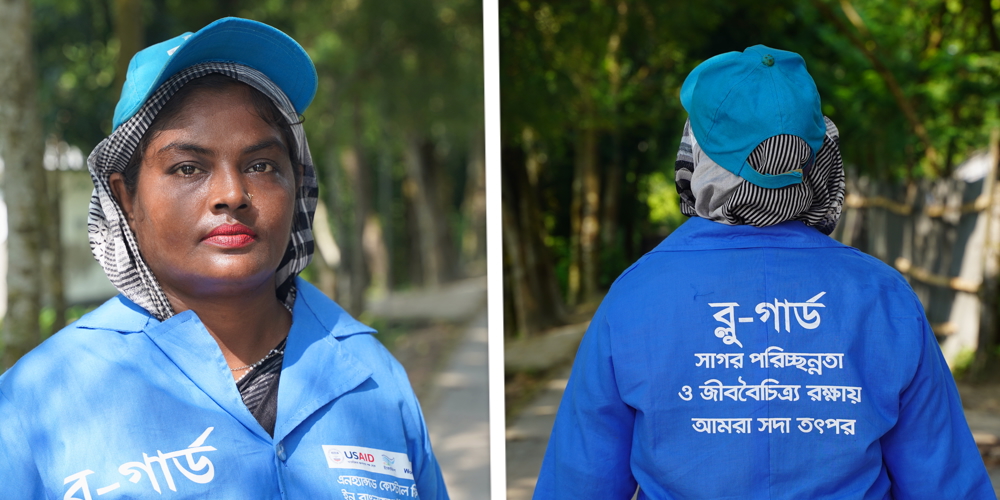
Roksana Akter, a 25 years old ‘Blue Guard’ from Ukhiya, Cox’s Bazar district, became involved with the group in 2021. Concerned about the growing threat of pollution from discarded fishing nets (ghost gear) and plastics, she joined the youth volunteer team, “Blue Guard”, dedicated to keeping the beach clean and protecting the environment.
"I began cleaning the beach as part of my responsibility to improve the marine ecosystems. I live by the sea, I’ve observed the changes from plastic pollution caused by artisanal fishing boats, locals and tourists as well. Taking on this responsibility was challenging for me as a woman from a marginalized fishing community. My husband did not support me for a couple of months. My in-laws and neighbors said negative things and asked me not to go, but I knew what I was doing." - Roksana Akter.

Roksana belongs to an artisanal coastal fishing community in Bangladesh, where women often face limited access to education, restricted freedom in choosing their paths, and pressure to follow male family members' decisions. While many women follow these traditional roles, Roksana chose a different path, boldly shaping her future based on her own choices and aspirations.
"In 2023, USAID’s ECOFISH II posted about me on their social media acknowledging my work. Suddenly, people's attitudes shifted, and they began to appreciate my efforts. That recognition empowered me. I have now decided to continue cleaning the beach and maintaining the cleanliness of my neighborhood. I became a Blue Guard for the rest of my life." - Roksana.
Scalable solution for improving Ecosystem Health
The Bay of Bengal faces significant threats from ghost gear, including abandoned or lost fishing nets from artisanal and commercial fishing practices. These nets cause severe harm to species such as crabs, turtles, dolphins, sharks, whales, and seabirds experience a high impact due to their size and vulnerability to entanglement. Additionally, ghost fishing causes medium to high damage to corals and seabed, disrupting fragile ecosystems and degrading marine biodiversity.
In response, USAID/ECOFISH II has raised public awareness among artisanal fishers, tourists and local communities, while engaging youth to mitigate the harmful effects of ghost gears and plastics. These volunteers encourage fishers to avoid discarding plastics and unused nets into the ocean and remain vigilant about abandoned nets, serving as stewards dedicated to improving the marine ecosystem.
USAID's ECOFISH II mobilized 140 young volunteers as Blue Guards from communities like Cox’s Bazar, Ukhiya, Teknaf, St. Martin Island, Moheshkhali, Kutubdia, Charfassion and Kuakata. These volunteers are working tirelessly to protect oceans from plastic waste and ghost gears that pose a silent threat to marine biodiversity.

The Blue Guards regularly organize beach clean-ups, raise awareness within their communities and remove harmful debris from the coastal beaches, including collecting plastic garbage from landed boats. Their efforts have already yielded significant results, with 36 metric tons of plastic waste and ghost gears removed, significantly contributing to a healthier marine ecosystem and inspiring others to act.
This initiative demonstrates how engaged youth can bring a positive environmental change and make a difference for coastal communities and the planet. Their story is a reminder that when young people are empowered, they become champions for conservation and protectors of our oceans for generations to come.
Dedicated and Active Efforts of Women in Conservation
Blue Guard, Mosammot Rema, 35 years old, has been working at Kuakata Beach with USAID’s ECOFISH II project since 2021. As a lifelong resident of the seaside, her deep connection with the environment motivates her passion for conserving the natural beauty of the coast. Rema goes beyond her assigned duties, often taking it upon herself to clean the beach whenever she can.
The Kuakata Municipality appreciated her devotion in 2023 and complimented her continuous commitment to her work. She was formally hired as a garbage collector because of this acknowledgement, providing her with an additional source of income.
“I will not stop contributing to biodiversity conservation even after the project ends.” She says with determination. Rema’s story is not only one of personal resilience but also a testament to how individual actions can make a difference in the community and the environment."

Biodiversity conservation is vital for Bangladesh, one of the world’s most climate-vulnerable countries. Historically, women, as essential contributors and community members, have had limited involvement in conservation efforts. However, under this project, 20% of Blue Guards are women who are now directly engaged in biodiversity conservation and ecosystem health improvement, marking a significant step toward inclusivity and environmental resilience.
